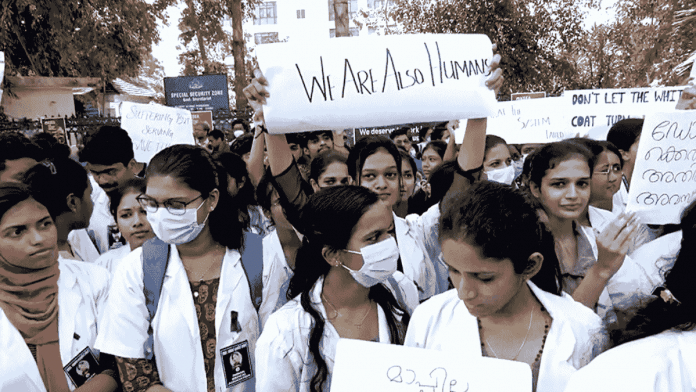New Delhi: This week’s killing of a Kerala doctor on duty has led to renewed calls for a central legislation to protect medical professionals — a development that comes four years after a proposed law covering such attacks was shelved due to objections from the Ministry of Home Affairs.
On Wednesday, Vandana Das, a doctor at the Kottarakkara Taluk Hospital in Kollam, was stabbed to death by a man she was treating.
The suspect, identified as Sandeep, a school teacher under suspension who had been brought to the hospital by the police for medical examination after a fight with his family, stabbed medical intern Das in her chest and neck, according to media reports.
Das died at a private hospital in Thiruvananthapuram hours later.
The incident has once again rekindled demands of a central legislation to protect doctors.
Called the Healthcare Service Personnel and Clinical Establishments (Prohibition of violence and damage to property) Bill, 2019, the proposed 2019 legislation was a result of a nationwide doctors’ protest.
The proposed bill was stringent in its penalties, not just for violence against doctors but also any damage to property. The penalty for grievous hurt caused in such cases could lead to 10 years of imprisonment and a fine of up to Rs 10 lakh, according to the draft bill.
Drafted at the behest of then Union health minister Harsh Vardhan — himself a doctor — the bill was cleared by the Union law ministry after being released for public feedback, government sources told ThePrint.
“However, the Ministry of Home Affairs objected to the draft bill on the grounds that there cannot be a separate, special law to protect a set of professionals from violence at the workplace,” a senior official in the health ministry said.
But the Kerala incident has sparked calls for such a law to be passed; condemning the incident, the Indian Medical Association, the largest network of doctors in the country, called for the implementation of a central law that could prevent such violence against medical professions.
“IMA stands in solidarity with the medical doctors and all healthcare workers who put their lives on the line every day to provide essential medical care to those in need,” the association said in a statement. “IMA also calls for the implementation of central law and measures to prevent violence against healthcare professionals in their workplace and declare hospitals as safe zones.”
Doctors that ThePrint spoke to believe such a law was imperative to protect doctors. Dr R.V. Asokan, a senior member of the IMA, conceded that while the law would be inadequate by itself, “it could at least be the beginning.”
“There is a central act protecting airlines and airports staff, because the government thinks they deserve protection — so who can’t doctors too have a separate law to protect them?” he asked.
Also Read: Modi govt builds more hospitals as population rises but India faces acute shortage of doctors
Growing violence against doctors
The immediate trigger for the 2019 legislation was an incident of violence at the Nil Ratan Sircar Medical College and Hospital in Kolkata. Paribaha Mukhopadhyay, a medical intern at the hospital, was assaulted by the family of a patient, leading to critical injuries.
Doctors at the hospital began holding protests which eventually spread across the country. Soon, medical professionals began demanding a law that could prevent such incidents.
Office bearers of the IMA said neither the West Bengal incident nor the Kerala one is isolated — over the last few years, there has been a growing number of attacks on doctors in hospitals, although there’s no separate government data on these.
Apart from proposing strict legal provisions for grievous attacks on doctors, the draft bill also penalises damage to a healthcare facility with an imprisonment between six months and five years and a fine between Rs 50,000 and Rs 5 lakh.
A senior doctor employed at a central government hospital in Delhi told ThePrint on the condition of anonymity that the situation got worse “during and after the Covid pandemic”.
According to Dr Asokan, while a central legislation is only the first step of a series of measures to protect doctors, “it will, at least, assure the fraternity that the government means business”.
“It’s the absence of the special law that makes the police indifferent and we see that in most cases of violence against doctors, there is no FIR or conviction in most cases,” he told ThePrint.
(Edited by Uttara Ramaswamy)






